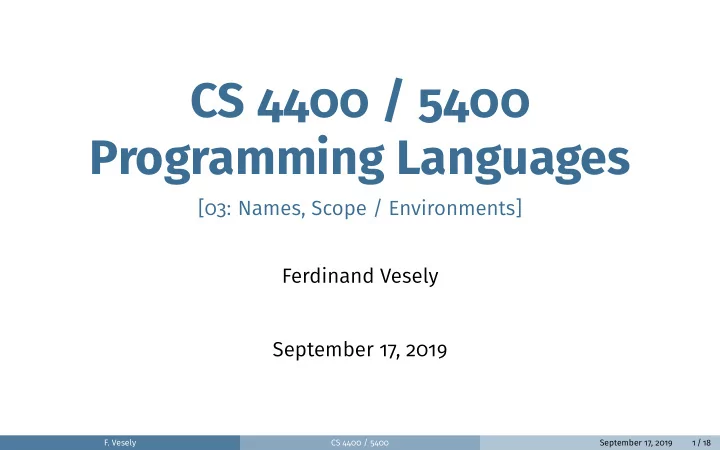

CS 4400 / 5400 Programming Languages [03: Names, Scope / Environments] Ferdinand Vesely September 17, 2019 F. Vesely CS 4400 / 5400 September 17, 2019 1 / 18
Recap
Recap We mentioned concrete syntax... Concrete Syntax What does an expression look like? 2 + 4 Exp / | \ / | \ / | \ Exp '+' Exp | | | | '2' '4' F. Vesely CS 4400 / 5400 September 17, 2019 3 / 18
Recap We talked about abstract syntax... Abstract Syntax What are the (semantically) significant / essential parts of an expression? 2 + 4 plus / \ / \ / \ 2 4 Do not worry about the details, what symbols are used to represent operations. F. Vesely CS 4400 / 5400 September 17, 2019 4 / 18
Recap We talked about BNF... BNF (Backus-Naur Form) A formalism for specifying syntax (concrete or abstract). Concrete: <Digit> ::= '0' | '1' | '2' | '3' | '4' | '5' | '6' | '7' | '8' | '9' <Decimal> ::= <Digit> | <Digit> <Decimal> <Exp> ::= <Decimal> | <Exp> '+' <Exp> | '(' <Exp> ')' F. Vesely CS 4400 / 5400 September 17, 2019 5 / 18
Recap BNF (Backus-Naur Form) Abstract: Assume <Nat>, the natural numbers <AExpr> ::= <AExpr> + <AExpr> // addition | <Nat> // number literal In Haskell: type Nat = Integer -- type synonym for "naturals" data AExpr = Add AExpr AExpr -- <AExpr> + <AExpr> | Num Nat -- <Nat> F. Vesely CS 4400 / 5400 September 17, 2019 6 / 18
Recap Haskell Abstract Concrete Add (Num 1) (Num 2) 1 + 2 (+ 1 2) 1 + 2 (1 2 +) F. Vesely CS 4400 / 5400 September 17, 2019 7 / 18
Recap We talked about evaluators... eval :: AExpr -> Integer eval (Add ae1 ae2) = eval ae1 + eval ae2 eval (Num n) = n F. Vesely CS 4400 / 5400 September 17, 2019 8 / 18
Recap We talked about bindings, substitution... let x = 3 in x + 4 F. Vesely CS 4400 / 5400 September 17, 2019 9 / 18
Today • More bindings • On scope • Environments • More than one type of value F. Vesely CS 4400 / 5400 September 17, 2019 10 / 18
Note I will switch to Scheme-like s-expressions for concrete representations or our languages. That is, I will write: instead of ( + 10 20) 10 + 20 instead of ( let (x 30) ( + x x)) let x = 30 in x + x etc. This is to distinguish our example languages from Haskell. F. Vesely CS 4400 / 5400 September 17, 2019 11 / 18
Bindings
Let bindings ( let (x ( + 10 20)) (* x x)) "Evaluate 10 + 20 to a value, then replace all occurrences of x in (* x x) with that value. Finally compute the value of that expression. eval (Let x ae1 ae2) = let v1 = eval ae1 ae2' = subst x v1 ae2 in eval ae2' We use a helper function, subst to do the actual substitution. F. Vesely CS 4400 / 5400 September 17, 2019 13 / 18
Substitution subst :: Vars -> Integer -> AExpr -> AExpr subst x v (Var y) | x == y = Num v -- variable found! | x /= Var y -- not "our" variable subst _ _ (Num i) = Num i -- nothing to substitute subst x v (Add ae1 ae2) = Add (subst x v ae1) (subst x v ae2) subst x v (Let y ae1 ae2) | x == y = Let y (subst x v ae1) ae2 -- peculiar case | x /= y = Let y (subst x v ae1) (subst x v ae2) F. Vesely CS 4400 / 5400 September 17, 2019 14 / 18
Scopes ( let (x 10) ( + x ( let (x ( + x 32)) (* 2 x)))) let x / \ 10 + / \ x \ let x / \ + * / \ / \ x 32 2 x F. Vesely CS 4400 / 5400 September 17, 2019 15 / 18
Environments Maps between variables and values (or expressions) • Can be thought of as “lazy” or “delayed” substitution. Three operations: 1. empty :: Env a � create an empty environment 2. add :: Var -> a -> Env a -> Env a � add a binding to an environment � sometimes also called update or extend 3. get :: Var -> Env a -> a � find the value bound to the given variable � also called find , lookup The type Env a = environments binding variables to values of type a • e.g., Env Integer F. Vesely CS 4400 / 5400 September 17, 2019 16 / 18
Environment Axioms • Different possible implementations • However, they need to satisfy these axioms: 1. get x (add x v env) == v 2. get x (add y v env) == get x env if x /= y 3. get x empty is undefined (results in an error) for any x F. Vesely CS 4400 / 5400 September 17, 2019 17 / 18
Environments For example: • Create an environment containing a single binding of "x" to the integer 42 (the type of the result will be Env Integer ) add "x" 42 empty • Find the binding for "x" in an environment (applying the axioms): get "x" (add "y" 10 (add "z" 20 (add "x" 30 empty))) = get "x" (add "z" 20 (add "x" 30 empty)) = get "x" (add "x" 30 empty) = 30 F. Vesely CS 4400 / 5400 September 17, 2019 18 / 18
Recommend
More recommend